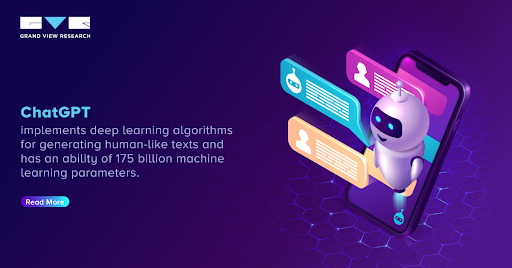Reforming The AI Text Generator Market: An In-Depth Look at ChatGPT's Impact
The rising prominence of Generative Pre-Trained Transformer (GPT) technology fosters industry growth
AI text generators use deep learning algorithms to generate text based on input data. These algorithms learn structures and patterns in the input data and use those patterns to generate new text resembling the input data. AI text generators can be trained on various data, including books, articles, social media posts, and even chat logs. AI text generators also have the capability to identify trends and patterns based on content previously written by humans and propose novel ideas to generate additional and often better texts. The algorithms accumulate myriad data from prevailing content, including search engines, websites, or videos on the internet. The increasing implementation of content generation and the social media marketing industry is accelerating the demand for AI text generators.
AI text generators can be used for various applications, including content creation, chatbots, and creative writing. These generators can create text in a variety of formats, including prose, poetry, and even code. The type of data used to train the model subsequently affects the style and content of the generated text. AI text generators also help finalize the written content by refining grammar, spelling, and style using AI algorithms. Rapid AI & ML algorithms adoption for process automation across sectors, including e-commerce and enterprise data management, is anticipated to augment the growth of the AI text generator.
A prominent example of an AI text generator is Generative Pre-trained Transformer 3 (GPT-3), or ChatGPT. ChatGPT is an AI-powered language model trained with an immense volume of text data from the web and can generate human-like text responses for particular prompts. It can generate creative writing pieces, answer questions, and converse on various topics. OpenAI developed and launched the language model in November 2022, which has been adopted rapidly since its release. ChatGPT has gained substantial prominence, witnessing the fastest growth in history to reach over 100 million users for a consumer application in just two months of its launch.

ChatGPT implements deep learning algorithms for generating human-like texts and has an ability of 175 billion machine learning parameters. As a result, it generates high-quality texts, making it challenging to determine if it is AI-generated or written by a human. It has various applications, such as creating and training bots, improving customer service with automated responses, and real-time language translation.
Overall, the applications of ChatGPT are varied and can significantly impact how humans interact with technology and each other. Furthermore, with the advent of ChatGPT, tech-driven companies are also investing in incorporating AI text-generation technologies in their operations. For instance, in February 2023, Microsoft announced an updated version of its search engine, Bing. The updated version will operate on a proprietary extension of ChatGPT and GPT-3.5, known as the Prometheus model.
One of the challenges with AI text generators is ensuring that the generated text is coherent and relevant to the input data. It requires careful training data selection and tuning of the model's parameters. Ethical concerns have been raised about the use of AI text generators, particularly in the context of generating fake news or propaganda. It is essential to use these tools responsibly and ensure that the generated text is factually accurate and does not promote harmful or misleading information.
With the influx of curiosity created by ChatGPT among the users, other market participants in the AI text generator market are also focusing on developing new alternatives in order to comply with the increased public interest, subsequently creating a competitive environment in the parasol. For instance, post the introduction of ChatGPT, in December 2022, LAION, a German non-profit organization in collaboration with YouTuber Yannic Kilcher, started developing an open-sourced and free alternative to ChatGPT known as OpenAssistant. The project is currently in the data collection and training phase. Similarly, in February 2023, Google commenced the introduction of Bard, an experimental service, proceeding with the LaMDA AI program that creates text responses to questions based on information from the web.
Furthermore, in March 2023, Open AI released the next generation of its ChatGPT, GPT-4. GPT-4 is a multimodal model that accepts text and image inputs and emits respective text outputs. It implements algorithms based on neural networks and has improved alignment with human commands and values. It is expected to have applications across various languages applications, including text summarization, grammar correction, language translation, & classification, chatbots, and code generation. The new version will have improved security, less bias, higher accuracy, and enhanced alignment providing robust and cost-efficient applications.
Authored By
Jagdishh Thadhanii | Cluster Head L1 - ICT
Jagdishh leads one of the prominent clusters within GVR, specializing in the ICT & TMT sector. With a wealth of combined experience spanning 7 years in IT & Strategy Consulting, Market Research, and Analytics, he demonstrates expertise in various domains. Jagdish undertakes thorough secondary and primary research to conduct meticulous data analysis. He also engages in interviews with key industry stakeholders to gain valuable insights into market dynamics and significant advancements. Moreover, Jagdish assumes responsibility for producing and refining customized and syndicated research reports, conducting market engineering and forecasting, as well as performing industry and competitive analyses. He actively monitors multiple Next-Generation technology sectors, specializing in cutting-edge areas like Artificial Intelligence, Machine Learning, Robotic Process Automation, Datacenters, Cloud Computing, Cybersecurity, Autonomous Vehicles, Mobility Devices, and more.